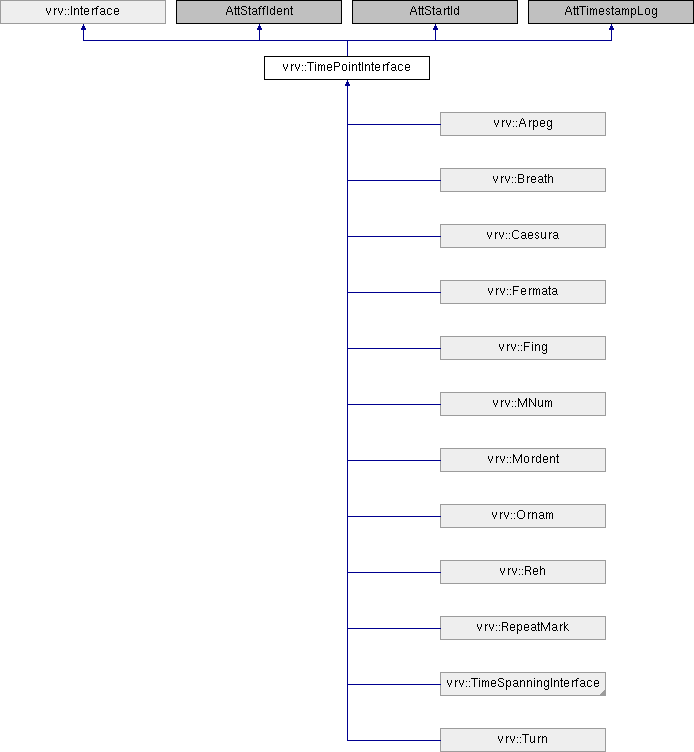 |
Verovio
Source code documentation
|
 |
Verovio
Source code documentation
|
This class is an interface for elements having a single time point, such as tempo, reh, etc. More...
#include <timeinterface.h>

Public Member Functions | |
| bool | SetStartOnly (LayerElement *start) |
| Set first LayerElement by verifying it is the correct one. | |
| void | AddStaff (int n) |
| Add a staff n to the AttStaffident vector (if not already there) | |
| bool | HasStart () const |
| Return true if a start is given (@startid or @tstamp) | |
| bool | IsOnStaff (int n) const |
| Return true if the TimePointInterface occurs on the staff Looks that the parent staff if the using @stardid or at the @staff values. | |
| bool | VerifyMeasure (const Object *owner) const |
| Return true if the interface owner is encoded in the measure of its start element Display a warning if not. | |
Constructors, destructors, reset methods | |
Reset method reset all attribute classes | |
| TimePointInterface () | |
| virtual | ~TimePointInterface () |
| void | Reset () override |
| Virtual reset method. More... | |
| InterfaceId | IsInterface () const override |
| Virtual method returning the InterfaceId of the interface. More... | |
Set and get the first LayerElement | |
The setter asserts that no LayerElement was previously set. | |
| void | SetStart (LayerElement *start) |
| LayerElement * | GetStart () |
| const LayerElement * | GetStart () const |
| Measure * | GetStartMeasure () |
| Return the start measure of the TimePointInterface. | |
| const Measure * | GetStartMeasure () const |
| std::vector< const Staff * > | GetTstampStaves (const Measure *measure, const Object *object) const |
| Return a vector of staves looking at the @staff attribute or at the parent staff of the @startid. | |
| std::vector< Staff * > | GetTstampStaves (const Measure *measure, const Object *object) |
| FunctorCode | InterfacePrepareTimePointing (PrepareTimePointingFunctor &functor, Object *object) |
| We have functor code in the interface for avoiding code duplication in each implementation class. More... | |
| virtual FunctorCode | InterfacePrepareTimestamps (PrepareTimestampsFunctor &functor, Object *object) |
| virtual FunctorCode | InterfaceResetData (ResetDataFunctor &functor, Object *object) |
 Public Member Functions inherited from vrv::Interface Public Member Functions inherited from vrv::Interface | |
| void | RegisterInterfaceAttClass (AttClassId attClassId) |
| Method for registering an MEI att classes in the interface. | |
| std::vector< AttClassId > * | GetAttClasses () |
| Method for obtaining a pointer to the attribute class vector of the interface. | |
| Interface () | |
| virtual | ~Interface () |
Protected Member Functions | |
| void | SetIDStr () |
| Extract the fragment of the start or end @xml:id if given. | |
Protected Attributes | |
| LayerElement * | m_start |
| std::string | m_startID |
This class is an interface for elements having a single time point, such as tempo, reh, etc.
It is not an abstract class but should not be instantiated directly.
| FunctorCode vrv::TimePointInterface::InterfacePrepareTimePointing | ( | PrepareTimePointingFunctor & | functor, |
| Object * | object | ||
| ) |
We have functor code in the interface for avoiding code duplication in each implementation class.
Since we are in an interface, we need to pass the object (implementation) to the pseudo functor method.
|
inlineoverridevirtual |
Virtual method returning the InterfaceId of the interface.
Needs to be overridden in child classes.
Reimplemented from vrv::Interface.
Reimplemented in vrv::TimeSpanningInterface.
|
overridevirtual |
Virtual reset method.
Needs to be overridden in child classes.
Reimplemented from vrv::Interface.
Reimplemented in vrv::Turn, vrv::Trill, and vrv::TimeSpanningInterface.